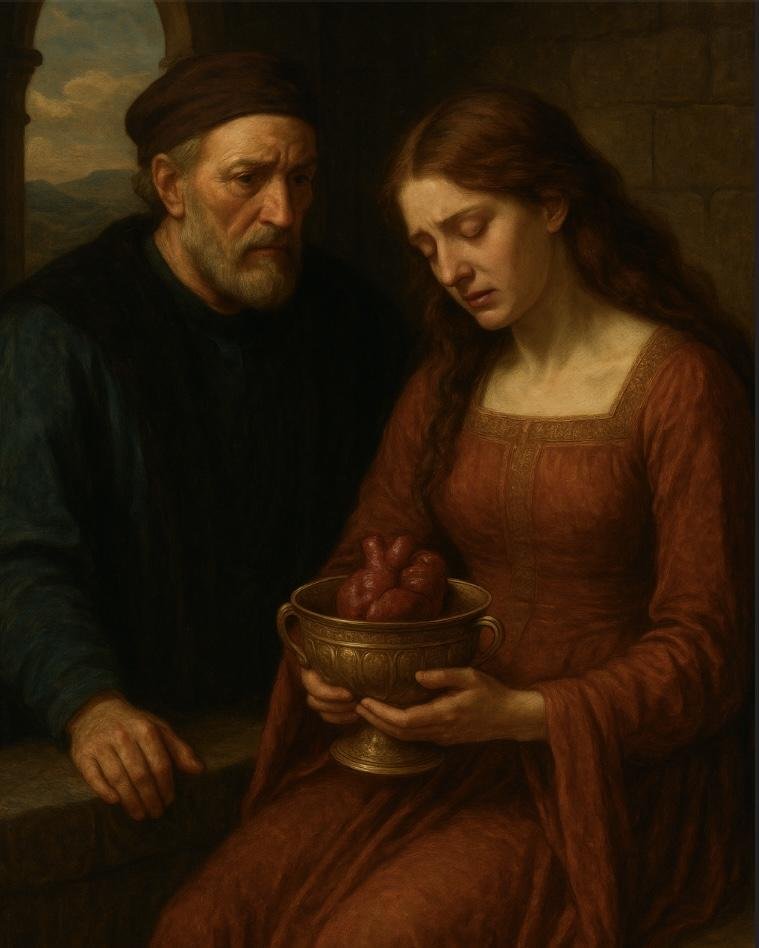Love, Control, and Tragedy: The Bleeding Heart of Ghismonda

Introduction:
In Giovanni Boccaccio’s The Decameron, Day 4 is dedicated to stories with tragic endings. The first tale, the story of Tancredi and his daughter Ghismonda, captures the devastating consequences of love denied by control. Through an emotionally gripping narrative of secrecy, paternal possessiveness, and doomed romance, Boccaccio delivers a timeless caution about the dangers of repression and the painful cost of overprotective love.
Summary:
Tancredi, the Prince of Salerno, dearly loves his daughter Ghismonda, but his excessive attachment leads him to keep her unmarried even after her widowhood. Ghismonda, unwilling to live without love, secretly takes a lover—Guiscardo, a man of lower status. When Tancredi discovers the affair, he has Guiscardo killed and sends his heart to Ghismonda in a golden cup. In a powerful act of defiance and sorrow, she drinks poison and dies over the heart of her lover.
Analysis:
At its core, this tale explores the destructive nature of possessive love. Tancredi’s role as a father becomes deeply problematic—his refusal to let Ghismonda live independently after her husband’s death turns protective love into a form of emotional imprisonment. His control becomes the very force that pushes Ghismonda to pursue a secret relationship, suggesting that repression often leads to rebellion.
Boccaccio masterfully uses irony and symbolism throughout the story. The heart, removed from Guiscardo’s chest and delivered in a golden goblet, becomes a literal and symbolic centerpiece. It is both a gift and a weapon—a heart once filled with love now transformed into a tool of punishment. Ghismonda’s final act of drinking poison over the heart is rich with layered meaning: a reclaiming of agency, an expression of unshakable love, and a protest against a world that would rather kill love than cross class boundaries.
Class and gender play significant roles in the tale. Guiscardo’s lower social rank makes the relationship unacceptable in Tancredi’s eyes, even though the lovers’ bond is pure. Ghismonda, on the other hand, is portrayed with remarkable dignity and intelligence. Her eloquent speech to her father before her death is not just a personal defense but a broader critique of societal double standards—especially those imposed on women.
Personal Response:
What stood out to me most in this story was Ghismonda’s strength. Even as her world collapses, she never lets go of her convictions. Her speech, her sorrow, and her ultimate decision show not weakness but an unshakable will. It’s hard not to admire her. Though tragic, the tale feels painfully modern in its commentary on parental control, gendered expectations, and the consequences of denying people the right to choose their own paths.
Conclusion:
The tale of Tancredi and Ghismonda is more than a story of doomed lovers—it’s a mirror reflecting the dangers of unchecked power, the rigidity of class, and the quiet strength of a woman who dared to love. Boccaccio’s storytelling blends emotion with critique, reminding us that even in the 14th century, people struggled with the same human conflicts we do today. Ghismonda’s voice still echoes, asking us: What is the cost of love, and who pays it when it’s denied?







